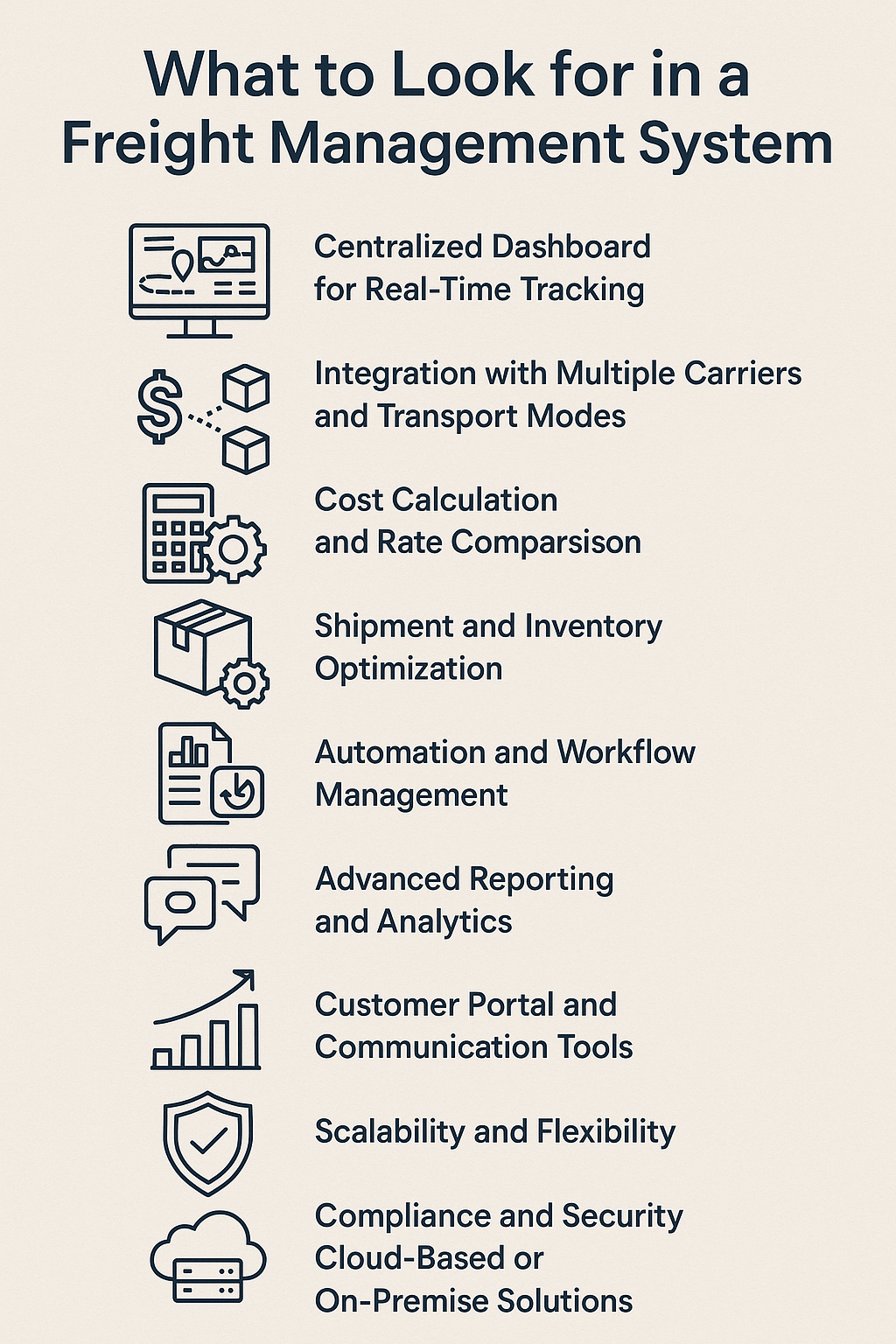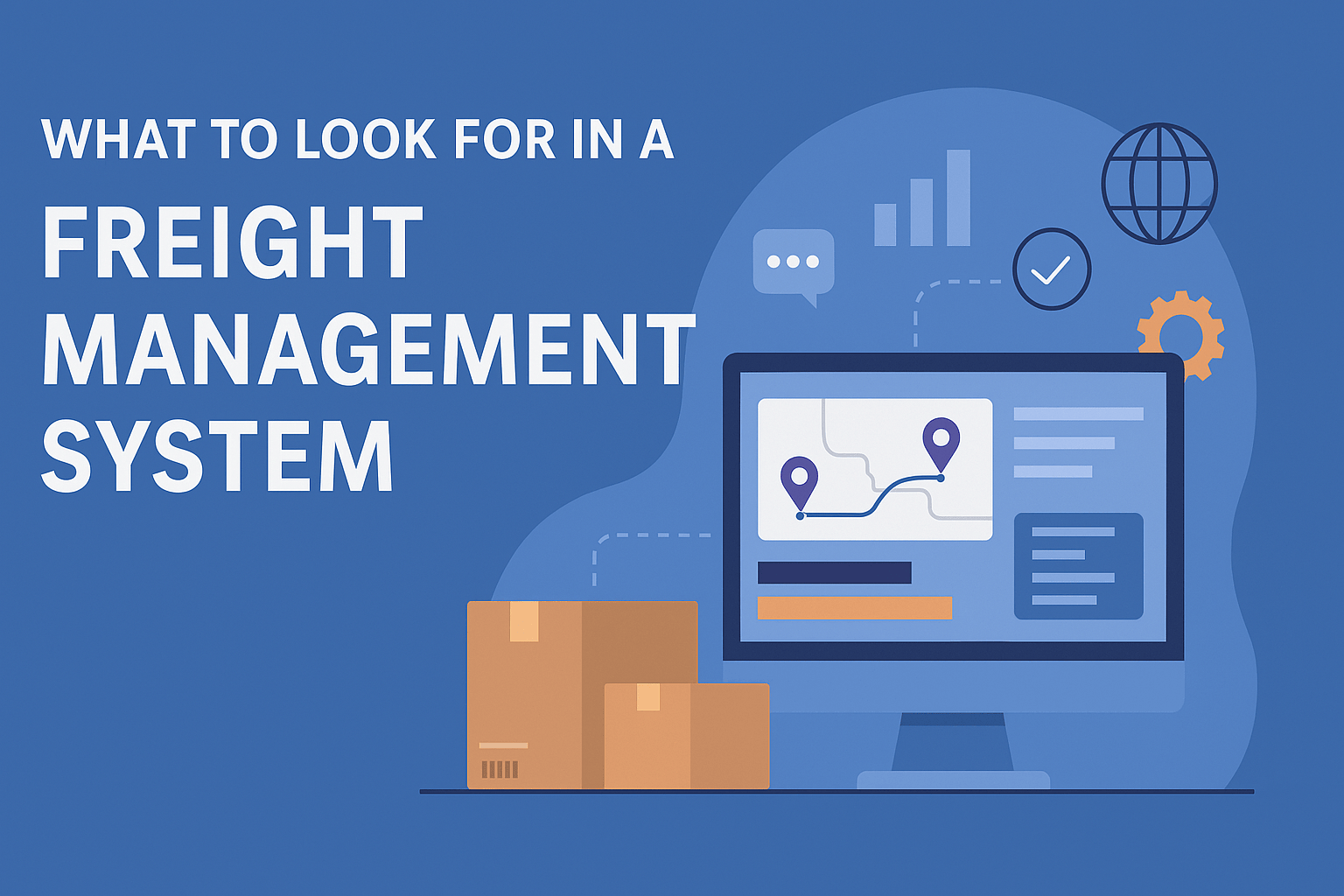A Freight Management System (FMS) is an essential tool for businesses involved in transportation, logistics, and supply chain management. It simplifies and streamlines the process of managing freight by providing visibility, control, and optimisation of shipments. A well-designed FMS can drastically improve operational efficiency, reduce costs, and improve customer satisfaction.
In this article, we will explore what to look for in a Freight Management System. We will cover the key features and functionalities that a top-tier system should offer and how it can benefit businesses, particularly freight people and companies that rely heavily on freight for their day-to-day operations.
Let's Get Straight To The Point
A Freight Management System (FMS) streamlines freight operations by improving visibility, control, and efficiency in logistics. Key features to look for include a centralised dashboard for real-time tracking, multi-carrier integration, cost calculation, shipment optimisation, automation, advanced reporting, and customer communication tools.
An effective FMS reduces costs, enhances customer satisfaction, and improves operational efficiency. It should also offer scalability, compliance tools, and robust security. Cloud-based systems are typically more cost-effective and easier to scale, while on-premise solutions offer greater control. Implementing an FMS can optimise shipping processes, reduce expenses, and support business growth.
Key Features to Look for in a Freight Management System
When selecting an FMS, it is crucial to understand the specific needs of your business and what the software can do to fulfil those needs. Below, we detail the critical features to look for in a Freight Management System:

1. Centralised Dashboard For Real-Time Tracking
A key feature of an effective Freight Management System is the centralised dashboard that offers a real-time overview of all shipments. The dashboard should provide information such as:
Shipment status
Estimated delivery times
Inventory levels
Tracking details
A centralised dashboard allows freight people to easily access all relevant data and make informed decisions quickly. This feature is crucial for preventing delays, managing unexpected issues, and enhancing customer satisfaction through timely updates.
2. Integration With Multiple Carriers And Transport Modes
In the world of logistics, there is no "one size fits all" when it comes to shipping. A Freight Management System should support integration with multiple carriers and transport modes (such as road, rail, air, and sea). This integration can provide businesses with the flexibility to choose the most cost-effective and timely option for each shipment.
Benefits of Multi-Carrier Integration:
Cost optimisation: Automatically select the best carrier based on the cost and service level.
Flexibility: Access a wide range of shipping options, including express, standard, and economy shipping.
Efficiency: Reduce the manual work involved in booking and managing shipments.
3. Cost Calculation And Rate Comparison
An advanced FMS offers the ability to calculate shipping costs and compare rates from various carriers and transport modes. By automating this process, freight people can save valuable time and ensure that they are always getting the best value for their shipments.
Cost calculation and rate comparison tools allow businesses to:
Compare shipping prices from different carriers
Determine the most cost-effective routes for specific shipments
Minimise freight spending through real-time calculations based on shipment data, weight, and dimensions
4. Shipment And Inventory Optimisation
Managing inventory and shipments in real time is another essential feature of a Freight Management System. An optimal FMS should help businesses ensure that they are efficiently utilising their freight capacity and resources. Key features to look for include:
Inventory management integration: Ensure that the FMS syncs seamlessly with inventory management software for up-to-date stock levels.
Load optimisation: Automatically calculate the best way to load shipments, maximising space and minimising costs.
Route optimisation: Use algorithms to find the fastest, most cost-effective delivery routes.
5. Automation And Workflow Management
A good Freight Management System can automate routine tasks and workflows, which significantly reduces manual input and human error. Automation can be particularly helpful for:
Creating shipping labels and documents
Generating invoices and payment receipts
Managing customs documentation for international shipments
Tracking and updating shipment status automatically
This reduces the administrative burden on freight people, allowing them to focus on more strategic tasks.
6. Advanced Reporting And Analytics
Data-driven insights can play a pivotal role in optimising logistics and supply chain management. An FMS should offer advanced reporting and analytics features that allow businesses to track performance metrics, identify inefficiencies, and make data-backed decisions. These reports could include:
Shipping performance reports
Carrier performance analysis
Cost analysis and savings reports
Inventory turn rates
Analytics help businesses identify trends, understand shipping patterns, and make proactive decisions to improve operations.
7. Customer Portal And Communication Tools
An essential part of improving customer satisfaction is ensuring clear and consistent communication. Many Freight Management Systems offer a customer portal that allows clients to track their shipments, view invoices, and manage deliveries. In addition to the customer portal, communication tools within the FMS should facilitate seamless interactions between internal teams, customers, and vendors.
8. Scalability And Flexibility
As your business grows, your freight needs will evolve. Look for a system that is scalable and flexible, allowing you to add more users, integrate with new carriers, and manage an increasing number of shipments.
9. Compliance And Security
Ensuring that your shipments are compliant with local and international regulations is crucial. An FMS should provide tools for managing compliance with various regulatory standards, including customs documentation, hazardous material handling, and tax management.
In addition to regulatory compliance, security is another important aspect to consider. The system should provide:
Data encryption to protect sensitive shipment and financial data.
User authentication and permission management to control access to sensitive information.
Audit trails to track changes and updates within the system.
10. Cloud-based or On-Premise Solutions
When deciding on a Freight Management System, it is important to consider whether to opt for a cloud-based or on-premise solution. Cloud-based systems are typically more cost-effective, easier to scale, and require less IT infrastructure. They also allow for real-time updates and remote access.
On the other hand, on-premise solutions offer more control over the system and may be a better option for businesses with strict data privacy or security requirements.
What is a Freight Management System?
A Freight Management System is a software platform designed to assist businesses in managing their logistics and freight operations more efficiently. The system provides tools for booking, tracking, and optimising shipments, managing inventory, and providing real-time visibility into the transportation process. This type of software also integrates with other systems, like transportation management systems (TMS), for end-to-end supply chain management.
The key objectives of an FMS are:
Reducing transportation costs
Optimising routing and delivery schedules
Improving visibility into the supply chain
Simplifying administrative tasks related to freight
With a solid Freight Management System, freight people can ensure smooth communication, timely deliveries, and optimised resources, enhancing both the speed and cost-effectiveness of their operations.
Benefits of Implementing a Freight Management System
Implementing an advanced Freight Management System can have a wide range of benefits for businesses involved in shipping and transportation.
Improved Efficiency
An FMS eliminates manual processes by automating tasks such as booking shipments, tracking packages, and generating invoices. This allows freight people to focus on more valuable activities, improving overall operational efficiency.
Cost Savings
By optimising routes, automating processes, and comparing carrier rates, businesses can reduce their overall freight costs. The system can identify the most cost-effective shipping options and help minimise unnecessary expenses.
Enhanced Visibility
A robust FMS provides real-time visibility into the status of shipments. This enables better decision-making, reduces the risk of delays, and ensures that businesses can respond quickly to any potential issues.
Better Customer Experience
A well-implemented Freight Management System improves customer experience by providing accurate delivery times, real-time tracking, and transparent communication. This leads to higher customer satisfaction and loyalty.
Scalability And Growth
As your business grows, an FMS can scale with your operations. Whether you're adding new carriers, expanding into new markets, or handling more shipments, the system can accommodate your changing needs.
Data-Driven Decisions
With powerful reporting and analytics tools, businesses can make data-driven decisions that improve logistics, reduce costs, and optimise overall supply chain performance.
Conclusion
Selecting the right Freight Management System can transform the way you manage logistics, shipments, and freight operations. By looking for key features like real-time tracking, multi-carrier integration, cost optimisation, automation, and robust reporting, you can ensure that your business stays ahead of the competition.
Whether you're a freight person handling day-to-day shipping operations or a business owner seeking to improve your logistics infrastructure, investing in the right FMS can lead to substantial cost savings, improved efficiency, and enhanced customer satisfaction.
FAQs
What Is The Difference Between Cloud-Based And On-Premise FMS?
Cloud-based FMS are cost-effective, easy to scale, and require minimal IT infrastructure, while on-premise systems offer more control over data security and privacy. The choice depends on business needs and preferences for data handling.
How Can An FMS Improve Customer Satisfaction?
By offering real-time tracking, accurate delivery times, and clear communication through a customer portal, an FMS helps provide a seamless customer experience, which increases satisfaction and loyalty.
Can An FMS Integrate With Other Systems?
Yes, most FMS can integrate with other platforms like Transportation Management Systems (TMS), inventory management software, and even customer relationship management (CRM) systems to streamline operations and provide end-to-end supply chain management.
Is An FMS Scalable As My Business Grows?
Yes, a good FMS is designed to scale with your business, allowing you to add new users, integrate additional carriers, and handle an increasing number of shipments as your operations expand.
How Does An FMS Help With Compliance?
An FMS helps ensure compliance by managing documentation for customs, hazardous materials, taxes, and other regulatory requirements, reducing the risk of penalties and delays.


